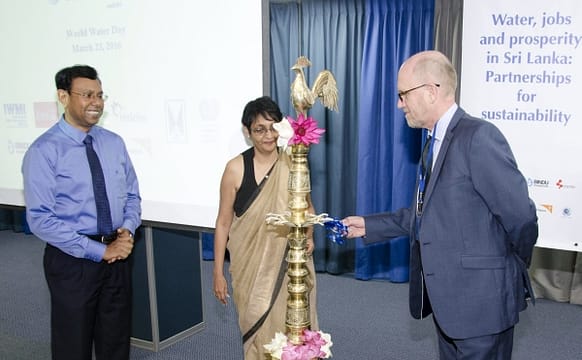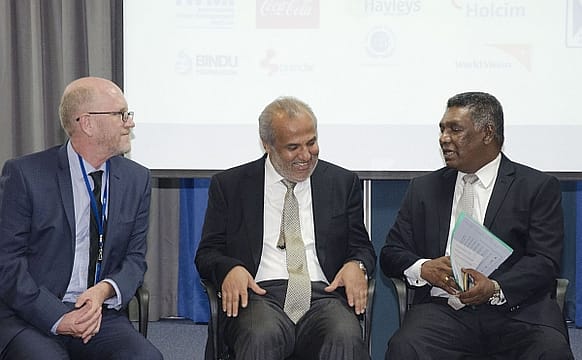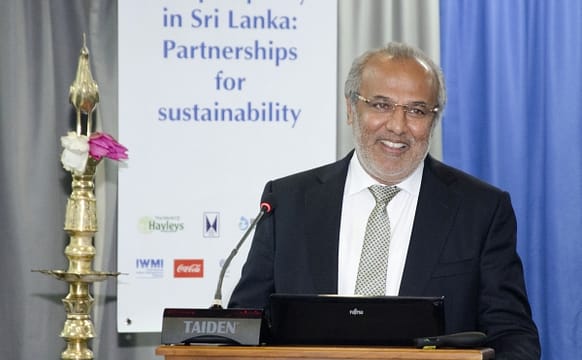Colombo, 23 March 2016. Sustainable job creation tops water agenda World Water Day dialogue stresses need for public and private sectors to work together for water-secure growth (Colombo, 23 March 2016). Scientists, policymakers and civil society organizations, together with representatives from some of Sri Lanka’s biggest companies, gathered for a lively dialogue on the future of the island’s water at the headquarters of the International Water Management Institute (IWMI) in Pelawatte, Battaramulla, to mark this year’s World Water Day.
Guest of honor at the discussion, entitled Water, jobs and prosperity in Sri Lanka: Partnerships for sustainability, was the Hon. Rauff Hakeem, Minister of City Planning and Water Supply.
Welcoming the guests, Herath Manthrithilake, Head, Sri Lanka Development Initiative, IWMI, stated that the country’s water resources were ample, but varied dramatically by season and geography. Managing this variability is likely to become more challenging with climate change.
Opening remarks were made by Shyama Salgado, National Program Manager, Fundamental Principles and Rights at Work, International Labour Organization (ILO), and Karunasena Hettiarachchi, former Secretary of the Ministry of Urban Development, Water Supply and Drainage, and currently Secretary of the Ministry of Defence. “The government is committed to developing key economic infrastructure such as irrigation. Water supply is pivotal to economic development of the country, which will, in turn, create jobs and reduce poverty,” said Hettiarachchi. “We need to make use of this golden opportunity to harness all our knowledge and skills to change and reform, so that the water sector will become more sustainable and more efficient.”
In a keynote address, Peter McCornick, Deputy Director General – Research, IWMI, stated that achieving water-related Sustainable Development Goals (SDGs) will require broad, practical partnerships. He pointed out that, while water scarcity is a significant and growing challenge in some areas, there are opportunities to further develop water resources in others. “Sustainable and equitable development needs to be determined for the specific situation,” said McCornick.
This theme was echoed by the other two keynote speakers. Dr. Tanuja Ariyananda, CEO, Lanka Rainwater Harvesting Forum, emphasized the considerable benefits that could be derived from improved collection of rainwater in the island. Dr. Ananda Mallawatantri, Country Representative, International Union for Conservation of Nature (IUCN), highlighted the growing threat from water pollution and proposed new strategies for tackling the problem.
After the keynote speeches, a lively panel discussion was held involving Ulrich Schmitt (World Bank), Badra Kamaladasa (Sri Lanka Water Partnership), Shyama Salgado (ILO), Anusha Alles (Brandix Lanka Limited), Professor Mahesh Jayaweera (University of Moratuwa) and Karunasena Hettiarachchi (Ministry of Defence).
“Water comes into contact with every sector that affects our lives,” said Hon. Rauf Hakeem closing the event. “It is not simply enough to have a World Water Day event, we need to try and create awareness and sustain it among the people. That is the challenge.”
The event was hosted by the International Water Management Institute (IWMI) in partnership with (in no particular order) the International Labour Organization (ILO); United Nations Global Compact, Sri Lanka; World Vision; Coca Cola; John Keells Holdings; Hayleys; LafargeHolcim; Bindu Foundation, Brandix Lanka Limited; and the World Bank.




